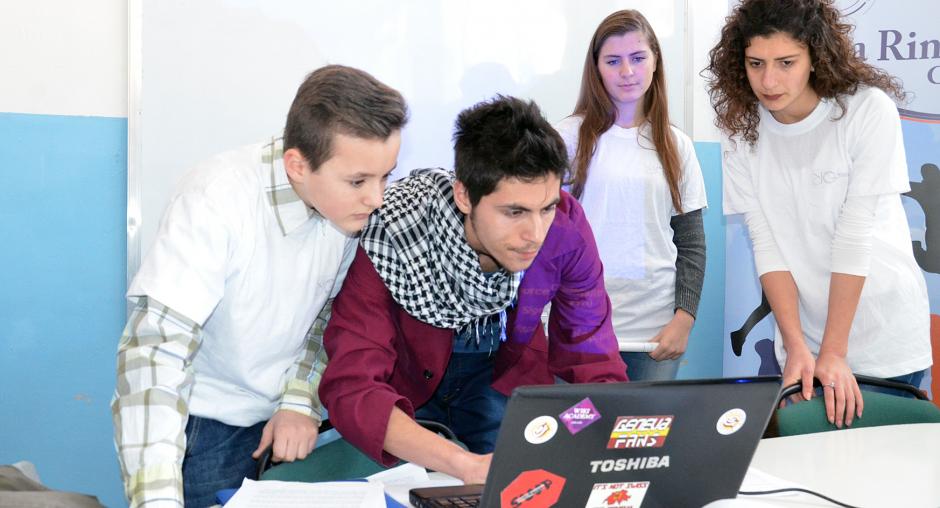OSCE-trained students teach their peers about children’s rights
Diar Ramadani, a 14-year-old student, makes the final preparations before he begins his lecture on children’s rights to some 30 students of Mehmet Isai High School in Gjilan/Gnjilane on 24 February 2014.
Just a few months earlier, Diar was part of a group of 15 students from five different schools in his town that attended a workshop organized by the OSCE Mission in Kosovo on international human rights standards and Kosovo’s legal framework, with a special focus on children’s rights.
“The workshop we organized in November 2013 was one of our activities aimed at promoting children’s rights,” says Maryse Chureau Human Dimension Officer from the OSCE Mission in Kosovo. “Together with the NGO Youth Centre, who approached us to help them increase the awareness among young children of their rights, we trained the students, facilitated debates and had the participants make drawings, depicting their understanding of human rights,” she adds.
Spreading the knowledge
According to Chureau, workshop participants showed strong commitment to the issue, and expressed interest in the development of follow-up lectures to be able to pass on the insight they gained to their peers.
As a result, a few months later, with the help of the Youth Centre and the OSCE Mission in Kosovo, they organized five events in their respective schools from 18 to 24 February, and presented the articles of the United Nations Convention on the Rights of the Child to some 150 students in total.
“All children are different, but all have the same rights,” Diar tells his audience in the final lecture. “The convention says that children should have equal opportunities and not be discriminated against. All of us here can do something humanitarian; we should help our friends in need, and not discriminate anyone because of their nationality, religion or gender.”
The ongoing age discrimination that Diar and his peers say they face regularly made him attend the initial workshop and then push for the follow-up lectures.
“Our society in general violates children’s rights,” he says. “And it happens everywhere, at school, in families, on the street,” Alora Hyseni, a co-lecturer, confirms. “I decided to study children’s rights and raise awareness about this issue having witnessed them violated almost on daily basis,” she adds.
“Challenges make us stronger”
Although Diar and Alora say that their families respect their rights and opinions, and fully support them in their activities, the same does not happen in other places. At an earlier debate organized by the Youth Center between school children and directors, Diar felt the discrimination on his skin.
“The director did not let me speak because he did not like what I was saying. He thought being older and a director gave him the right to hush me and, in fact, that got me to become even more active so I signed up for the workshop and insisted on the need to organize the follow-up lectures,” he says.
Students, who participated in the lecture, expressed similar concerns. Violations happen, and this lecture will enable us to better identify them and raise our voice,” says Kaltrina Syla, a 10th grader. “It also made us more curious to read about the Convention and other means that protect children’s rights,” she adds.
Going beyond
Diar also plans to do more by becoming a member of the Youth Center, and by continuing to raise awareness about human and children’s rights.
“People should become aware of human rights in general, and children’s rights in particular, not just my peers, but also grownups,” he says. “For example, people over 30, who did not have a chance to get familiar with children’s rights, should have the opportunity to understand that no-one has the right to violate the rights that I’m entitled to,” Diar concludes.
Luljeta Ismaili from the Youth Center says they were happy to see the enthusiasm of the students to reach as far out to other students as they could.
“They wanted to do it themselves, but they had our support too, just in case,” she says. “Together with the OSCE representatives we were present at all the lectures to show them our support, and we were happy to see they did a good job.”

